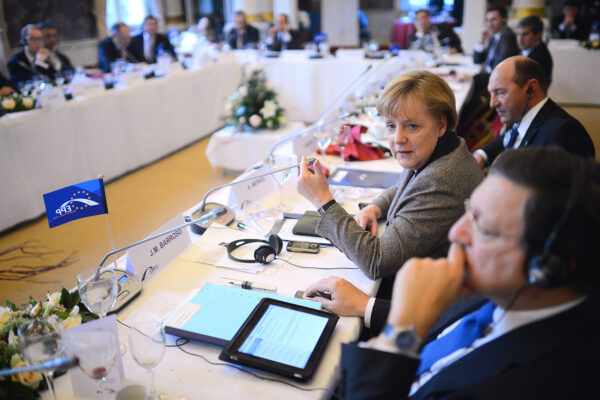
Polls predict that German chancellor Angela Merkel will cruise to a comfortable victory in this week’s parliamentary elections. We would welcome her reelection.
Although the liberal Free Democrats, who emphasize economic freedom and individual responsibility, are more aligned with the Atlantic Sentinel‘s views, their leader, economy minister Philipp Rösler, looks unfit for the chancellorship. Merkel, by contrast, has proven herself to be a wise leader since she first assumed office in 2005 — sometimes pragmatic, otherwise steadfast.
Step by step
Frequently derided in other English-language press for her reluctance to embrace sweeping economic and political reforms in Europe since the sovereign debt crisis began, Merkel’s caution is actually appropriate.
She recognizes that far deeper integration, which could make German taxpayers liable for bank failures in, and the borrowing of, profligate Mediterranean states, would undermine European solidarity rather than strengthen it. She has to balance the interests of her own voters — as well as those of neighboring Northern European states — against the need to prevent the currency union from disintegrating. Her step-by-step approach is the best strategy.
Resolve abroad
Outside Europe, Merkel has demonstrated more resolve.
She resisted American efforts to enforce a “rebalancing” of global trade in favor of net importers like the United States, arguing, in 2010, that “the benchmark has to be the countries that have been most competitive, not to reduce to the lowest common denominator.”
She has also criticized the European Commission for levying a tariff on Chinese solar panel imports, advocating free trade instead.
Both occasions cemented a Sino-German accord that enhances trade relations between two of the world’s largest export economies.
Leftists criticize the Christian Democrat for entertaining alliances with authoritarians even when she censured Russia’s Vladimir Putin for presiding over an erosion of civil liberties in his country. At the same time, she will not jeopardize a relationship that is critical to Germany energy security, especially when it seeks to wean itself off nuclear energy.
Green failure
If Merkel has failed in one regard, it is energy.
In an obviously political move, she advocated denuclearization following the 2011 Fukushima power plant disaster in Japan, fearing competition from the Green party. As a consequence, Germany will probably have to rely more on burning coal that is imported from Poland while the green Energiewende she championed looks increasingly off course. German businesses and consumers are paying too high a price for trying to meet renewable energy targets that may well be unattainable. The chancellor needs to turn on this misguided policy or risk sacrificing German competitiveness.
For this reason, we advise against a coalition with the Greens. The once far-left pacifist movement will ask a high price for entering a government with the conservatives whom many of their voters despise. There are no tangible benefits for the conservatives in pursuing such a coalition, beyond appealing to socially liberal middle-class voters who might appreciate its cosmopolitanism.
Right-wing pact
Even if Merkel’s last government with the Free Democrats accomplished little in the way of market reform, instead reaping the benefits of labor reforms enacted by the former Social Democrat chancellor, Gerhard Schröder, a continuation of this alliance seems to us the best outcome for Germany.
The two right-wing parties kept the deficit down without raising taxes. They also advocate sensible tax reform when workers are currently discouraged from seeking even a modest raise that could put them in a higher bracket — something that was unfortunately blocked by the left.
Grand coalition
Should the liberals fail to cross the 5 percent election threshold to enter parliament, which is quite possible, a grand coalition with the Social Democrats, such as Merkel previously led between 2005 and 2009, is inevitable.
They, too, will demand significant concessions. The previous left-right alliance cost the Social Democrats more than 10 percent support while it raised Merkel’s profile as a national leader. If she seeks to lure the Social Democrats into another coalition, Merkel must give them signature policies to claim as their own and perhaps a majority of her cabinet posts.
That would make it harder for Merkel to enact tax relief and conduct the sort of dispassionate foreign policy she has so far.
But it would also give the government a strong mandate to remove labor market rigidities and curb unemployment. Unlike the left in France and the United States, Germany’s Social Democrats are no enthusiasts for deficit spending nor are they beholden to their union allies like Britain’s Labour Party.
While generally supportive of green energy policies like most leftists internationally, the Social Democrats’ leader Peer Steinbrück has also criticized Germany’s high electricity costs. His proposal — forcing energy companies to lower their prices — is unrealistic but in a coalition with Merkel’s conservatives, both parties might yet embrace a pragmatic energy program.
Even in such a government, the chancellor could remain the stewart of Germany’s economic success her campaign claims she is.
